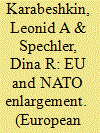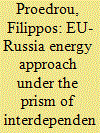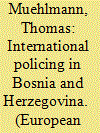|
|
|
Sort Order |
|
|
|
Items / Page
|
|
|
|
|
|
|
| Srl | Item |
| 1 |
ID:
080524


|
|
|
|
|
| Publication |
2007.
|
| Summary/Abstract |
For Russian policymakers no events in the post-Cold War period have had more momentous consequences or received greater public commentary, both before and after they occurred, than the almost simultaneous enlargement of NATO and the EU that took place in 2004. The most sensitive aspect of this 'dual enlargement' for the Russian Federation was the extension of these two organisations into the Baltic States, which had been part of the Soviet Union itself. Despite some uneasiness, Moscow anticipated that the extension of the EU into the former Soviet sphere, even into the former Soviet Union itself, would constitute a generally positive development, while NATO penetration of that sphere would be extremely harmful. Accordingly, Russia voiced little opposition to the EU's plans and made only limited efforts to insure that its major interests would be protected, while it actively sought to forestall the NATO project, especially with regard to the Baltics. As it turned out, however, most of Russia's expectations regarding the impact of these processes were mistaken, and Russia's interests were poorly served by its prior and subsequent responses
|
|
|
|
|
|
|
|
|
|
|
|
|
|
|
|
| 2 |
ID:
080525


|
|
|
|
|
| Publication |
2007.
|
| Summary/Abstract |
This essay aims to analyse and interpret the EU-Russia approach in the energy sector under the prism of interdependence. It seeks to account for both the increasing cooperation among EU member-states and Russia as far as security of supplies is concerned, but also provides a sound explanation for the steady clashes between the two sides. For this reason, we use the terms sensitivity and vulnerability to refer to the position that each side holds on bilateral energy matters and, accordingly, to the actions it is capable of taking to resolve its problems. This model of interdependence provides a profound understanding of the bifurcated relationship between the EU and Russia and interprets both its cooperative and conflictive elements.
|
|
|
|
|
|
|
|
|
|
|
|
|
|
|
|
| 3 |
ID:
080527


|
|
|
|
|
| Publication |
2007.
|
| Summary/Abstract |
Police Reform in Bosnia went through different phases. Particularly when starting to address the organisational reform of police forces, new structures and institutions were introduced. This, however, was undermined by the behaviour of leading police officers and particularly the political elite fearing for their influence over the police. The essay argues that in such reforms, in particular at later stages of a reform process, when the organisational setup and the culture of policing is addressed, they tend to be hampered by a lagging behind of mindsets compared to the establishment of new structures/institutions, in particular also in the political elite - a factor that needs to be taken into consideration and that leads to the conclusion that police reform needs a long breath to be continued engagement to become irreversible and sustainable.
|
|
|
|
|
|
|
|
|
|
|
|
|
|
|
|
| 4 |
ID:
080523


|
|
|
|
|
| Publication |
2007.
|
| Summary/Abstract |
Missile defenses will neither derail the post-Cold War political relationship between the US and Russia nor repeal the existence of mutual deterrence as between their respective nuclear arsenals. Because politics rules strategy and strategy must pay homage to the realities of physics, missile defenses will emerge into arsenals gradually, if at all. Whether missile defenses exacerbate political tensions, or can be deployed cooperatively by the United States and/or NATO and Russia, is not a technological given, but a political decision point that will require care taking by the current and prospective administrations in Washington and Moscow
|
|
|
|
|
|
|
|
|
|
|
|
|
|
|
|
| 5 |
ID:
080521


|
|
|
|
|
| Publication |
2007.
|
| Summary/Abstract |
The European Union has since 2003 developed both a security and a Weapons of Mass Destruction strategy, and it has become the primary interlocutor of Iran in the dispute related to Iran's nuclear development. These are signs of significant policy progress. However, the fact that four years of nuclear diplomacy have brought few results invites a critical appraisal of EU strategy. This essay undertakes this appraisal, arguing that the EU is notably ambivalent regarding its underlying conception of international order. The EU wishes to be pluralist (in the tradition of sovereign equality), but is also anti-pluralist (in the liberal-democratic tradition). The essay lays out how the EU has coped with pressures for reform - arising notably from the United States - within the current international nuclear non-proliferation regime, and how this has made the EU problem apparent. The essay finally suggests that to salvage its policy of effective multilateralism the EU must acknowledge its anti-pluralist bias and promote a common transatlantic approach to nuclear non-proliferation
|
|
|
|
|
|
|
|
|
|
|
|
|
|
|
|
| 6 |
ID:
080519


|
|
|
|
|
| Publication |
2007.
|
| Summary/Abstract |
In the EU's internal security policy-making, parliamentary power remains - de jure and de facto - patchy. This situation has been (unofficially) justified by reference to the idea that the liberal constraints on executive power typically introduced by parliaments mark an irresponsible challenge to the effectiveness of policy. This essay tests this apologia, examining three cases where the retention of liberal values would actually be conducive to effectiveness: the EU-US 'Passenger Name Register Agreement', the elaboration of common data protection standards and the 'Returns Directive' on the expulsion of illegal immigrants. It suggests that the posited 'rights/effectiveness' incompatibility in fact masks a search for autonomy by executive participants
|
|
|
|
|
|
|
|
|
|
|
|
|
|
|
|
| 7 |
ID:
080526


|
|
|
|
|
| Publication |
2007.
|
| Summary/Abstract |
This essay examines growing European Union (EU) involvement in the South Caucasus, focusing on efforts to resolve the protracted conflicts in the regions of Abkhazia, South Ossetia and Nagorno-Karabakh. To date, the EU has occupied a back seat in conflict resolution efforts, supporting organisations such as the UN and OSCE, which have taken the lead role. However, over a decade of negotiations has produced few tangible results and the EU now has the opportunity to play a much greater role. This essay argues that the EU needs to become more involved: it has a much wider range of tools at its disposal with which to influence the various situations and it is in its own interest to ensure the stability of its neighbours
|
|
|
|
|
|
|
|
|
|
|
|
|
|
|
|
| 8 |
ID:
080509


|
|
|
|
|
| Publication |
2007.
|
| Summary/Abstract |
The creation of the Single European Market has been accompanied by an intense discussion on whether market-creating measures have been privileged over market-correcting ones by the institutional system of the EU. The creation of an 'Area of Freedom, Security and Justice' (AFSJ) launched by the Treaty of Amsterdam poses a similar question which, however, has remained heavily under-researched: will the balance between policing competencies and individual rights shift towards the former at the expense of the latter? Recent work on the 'new raison d'état' and the strengthening of national executives in processes of Europeanisation points in this direction. This essay explores the parallels between the Common Market and the AFSJ with regard to the relationship between the structures and substance of governance. The balance between security and individual rights is scrutinised in the main pillars of the AFSJ: asylum cooperation, judicial cooperation in criminal matters and police cooperation
|
|
|
|
|
|
|
|
|
|
|
|
|
|
|
|
|
|
|
|
|